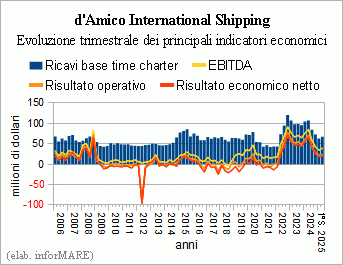
The d'Amico International Shipping Company (DIS), which has a
fleet of 31 MR and LR1 tankers operated through the subsidiary
operational d'Amico Tankers, concluded the second quarter of
this year with base time charter revenues of 87.8 million
dollars, down -37.1% on the same period in 2024. EBITDA
EBIT was almost €39 million (-54.2%), EBIT of €22.6 million
(-67.9%) and net income of $19.6 million (-70.5%).
 Commenting on the trend of activity in the second
quarter of 2025 the CEO of DIS, Carlos di
Mottola, explained that, "overall, DIS has continued to
benefit from a favourable market environment, supported by
persistent disruptions in trade, from a growth in
fleet and the evolution of the transport routes of
petroleum. The circumnavigation of the Cape of Good Hope, resulting from
hostilities in the Strait of Bab-el-Mandeb, and sanctions
on Russian oil - noted di Mottola - have
profoundly changed trade routes, increased distances
travel averages and supporting demand measured in
ton-miles. The increase in the number of ships sanctioned by
part of the governments of the United States, the United Kingdom and the European Union is
by significantly reducing the fleet available to
lawful trafficking. In this context, on 18 July 2025, the Union
European Union has adopted one of the most severe sanctions packages
so far - by establishing a dynamic cap on the price of crude oil equal to
initially at US$ 47.6/barrel (subject to semi-annual review),
excluding an additional 22 Russian banks from the SWIFT system and hitting
105 tankers of the so-called "shadow fleet",
as well as the subjects who facilitate their operations. Starting
From January 2026, a ban will also come into force
on the purchase of refined products obtained from Russian crude oil.
Despite the high geopolitical risk and volatility of
- factors that have supported the markets of the
NOLI - We believe the fundamentals of the sector remain strong. The
growth in global oil demand has shown signs of
slowdown, due to weak macroeconomic and
of the increase in trade tensions. However, according to the Agency
International Energy Crisis (IEA), the demand for oil is
set to increase by 0.7 million barrels per day both in the
2025 and in 2026, after an increase of 0.8 million barrels per year
day in 2024. Meanwhile, countries' oil supply is not
OPEC membership is growing and OPEC+ has accelerated
the process of reversing voluntary cuts, effectively restoring
Almost 80% of the cuts by August, well ahead of schedule. The
oil market - concluded di Mottola - could therefore
heading towards a phase of oversupply, with a possible
configuration of the forward price curve in "contango",
A historically favourable scenario for the ship sector
cistern".
Commenting on the trend of activity in the second
quarter of 2025 the CEO of DIS, Carlos di
Mottola, explained that, "overall, DIS has continued to
benefit from a favourable market environment, supported by
persistent disruptions in trade, from a growth in
fleet and the evolution of the transport routes of
petroleum. The circumnavigation of the Cape of Good Hope, resulting from
hostilities in the Strait of Bab-el-Mandeb, and sanctions
on Russian oil - noted di Mottola - have
profoundly changed trade routes, increased distances
travel averages and supporting demand measured in
ton-miles. The increase in the number of ships sanctioned by
part of the governments of the United States, the United Kingdom and the European Union is
by significantly reducing the fleet available to
lawful trafficking. In this context, on 18 July 2025, the Union
European Union has adopted one of the most severe sanctions packages
so far - by establishing a dynamic cap on the price of crude oil equal to
initially at US$ 47.6/barrel (subject to semi-annual review),
excluding an additional 22 Russian banks from the SWIFT system and hitting
105 tankers of the so-called "shadow fleet",
as well as the subjects who facilitate their operations. Starting
From January 2026, a ban will also come into force
on the purchase of refined products obtained from Russian crude oil.
Despite the high geopolitical risk and volatility of
- factors that have supported the markets of the
NOLI - We believe the fundamentals of the sector remain strong. The
growth in global oil demand has shown signs of
slowdown, due to weak macroeconomic and
of the increase in trade tensions. However, according to the Agency
International Energy Crisis (IEA), the demand for oil is
set to increase by 0.7 million barrels per day both in the
2025 and in 2026, after an increase of 0.8 million barrels per year
day in 2024. Meanwhile, countries' oil supply is not
OPEC membership is growing and OPEC+ has accelerated
the process of reversing voluntary cuts, effectively restoring
Almost 80% of the cuts by August, well ahead of schedule. The
oil market - concluded di Mottola - could therefore
heading towards a phase of oversupply, with a possible
configuration of the forward price curve in "contango",
A historically favourable scenario for the ship sector
cistern".